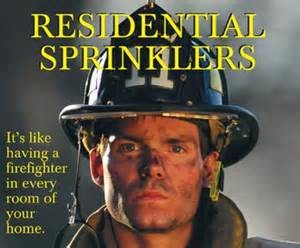By: Robert Avsec, Executive Fire Officer
Reading the Sunday newspaper (Yes, some of us still enjoy starting the day by reading the written word printed on  paper, especially the Sunday edition over a steaming cup of coffee) when I came across this headline:
paper, especially the Sunday edition over a steaming cup of coffee) when I came across this headline:
Survey: 7 in 10 Americans believe in solid evidence of global warming
Now this is not a piece about global warming, but rather a discussion on how important it is to change the public’s opinions or perceptions about something before you can ever expect to change their behaviors. Don’t believe it? Look how long it took for being a non-smoker to become the norm in the United States, despite people knowing for decades that smoking was bad for their health (Cigarettes didn’t pick up slang name like “coffin nails” or “cancer sticks” overnight, now did they?).
 What took so long you might ask? As we’ve slowly, but surely, come to know is that for decades the tobacco industry in the United States has conducted a carefully orchestrated campaign of misinformation designed to keep people from knowing the true health dangers of smoking. And their campaign wasn’t just about suppressing or manipulating information: it was about keeping current smokers smoking and attracting new smokers, especially amongst young people (Anyone remember Joe Camel?).
What took so long you might ask? As we’ve slowly, but surely, come to know is that for decades the tobacco industry in the United States has conducted a carefully orchestrated campaign of misinformation designed to keep people from knowing the true health dangers of smoking. And their campaign wasn’t just about suppressing or manipulating information: it was about keeping current smokers smoking and attracting new smokers, especially amongst young people (Anyone remember Joe Camel?).
We want to eliminate preventable fires and the resultant deaths and injuries and property losses in the United States, right? Of course we do. But to make the attainment of that goal a reality we have to recognize that there are still a couple of significant obstacles to us reaching the “tipping point”:
- The average citizen believes that fires are unavoidable accidents rather than predictable and preventable events; and
- Public and private sector organizations and their leaders use misinformation tactics to prevent the adoption of laws, codes, and ordinances that would reduce the number of fires and reduce the severity of impact for those fires that did occur.
Don’t believe that second one?
- How else do you explain the fact that the legislatures in 38 out of 50 states have enacted laws that prohibit the
 adoption of local ordinances requiring residential fire sprinkler systems in all new residential dwellings?
adoption of local ordinances requiring residential fire sprinkler systems in all new residential dwellings? - Or the continuing misinformation campaign by builders and developers that tells the public that the added cost of residential sprinkler systems would drive up new home costs and kill the sale of new homes and kill jobs?
- Or the continuing misinformation campaign by some in the insurance industry that sprinklers cause more property damage from water damage than a fire would? (Really?)
- Or the most recent one where the public is being told that the cost to service and maintain a residential sprinkler system is more expensive than it’s worth (So, the heating and air-conditioning system or the plumbing system come with no future costs for service and maintenance? Also,
By: Robert Avsec, Executive Fire Officer
Reading the Sunday newspaper (Yes, some of us still enjoy starting the day by reading the written word printed on
 paper, especially the Sunday edition over a steaming cup of coffee) when I came across this headline:
paper, especially the Sunday edition over a steaming cup of coffee) when I came across this headline:Survey: 7 in 10 Americans believe in solid evidence of global warming
Now this is not a piece about global warming, but rather a discussion on how important it is to change the public’s opinions or perceptions about something before you can ever expect to change their behaviors. Don’t believe it? Look how long it took for being a non-smoker to become the norm in the United States, despite people knowing for decades that smoking was bad for their health (Cigarettes didn’t pick up slang name like “coffin nails” or “cancer sticks” overnight, now did they?).
 What took so long you might ask? As we’ve slowly, but surely, come to know is that for decades the tobacco industry in the United States has conducted a carefully orchestrated campaign of misinformation designed to keep people from knowing the true health dangers of smoking. And their campaign wasn’t just about suppressing or manipulating information: it was about keeping current smokers smoking and attracting new smokers, especially amongst young people (Anyone remember Joe Camel?).
What took so long you might ask? As we’ve slowly, but surely, come to know is that for decades the tobacco industry in the United States has conducted a carefully orchestrated campaign of misinformation designed to keep people from knowing the true health dangers of smoking. And their campaign wasn’t just about suppressing or manipulating information: it was about keeping current smokers smoking and attracting new smokers, especially amongst young people (Anyone remember Joe Camel?).We want to eliminate preventable fires and the resultant deaths and injuries and property losses in the United States, right? Of course we do. But to make the attainment of that goal a reality we have to recognize that there are still a couple of significant obstacles to us reaching the “tipping point”:
- The average citizen believes that fires are unavoidable accidents rather than predictable and preventable events; and
- Public and private sector organizations and their leaders use misinformation tactics to prevent the adoption of laws, codes, and ordinances that would reduce the number of fires and reduce the severity of impact for those fires that did occur.
Don’t believe that second one?
- How else do you explain the fact that the legislatures in 38 out of 50 states have enacted laws that prohibit the
 adoption of local ordinances requiring residential fire sprinkler systems in all new residential dwellings?
adoption of local ordinances requiring residential fire sprinkler systems in all new residential dwellings? - Or the continuing misinformation campaign by builders and developers that tells the public that the added cost of residential sprinkler systems would drive up new home costs and kill the sale of new homes and kill jobs?
- Or the continuing misinformation campaign by some in the insurance industry that sprinklers cause more property damage from water damage than a fire would? (Really?)
- Or the most recent one where the public is being told that the cost to service and maintain a residential sprinkler system is more expensive than it’s worth (So, the heating and air-conditioning system or the plumbing system come with no future costs for service and maintenance? Also, you can find out more about plumbing here!
So I ask you, how do we get the public to “come around” to the notion that fires are preventable like they have about the health dangers of smoking?
 Fire & EMS Leader Pro The job of old firefighters is to teach young firefighters how to become old firefighters!
Fire & EMS Leader Pro The job of old firefighters is to teach young firefighters how to become old firefighters!